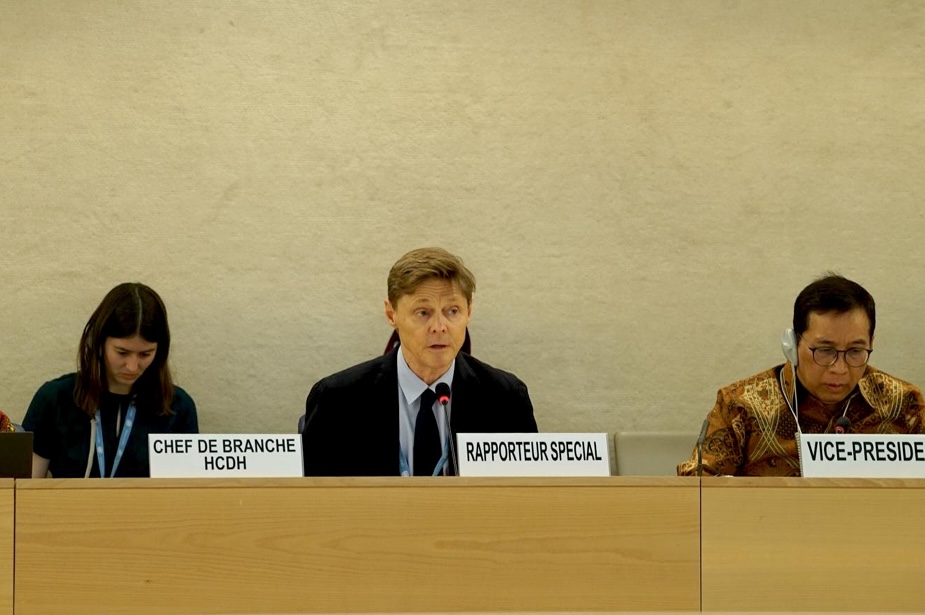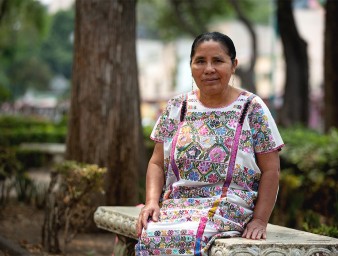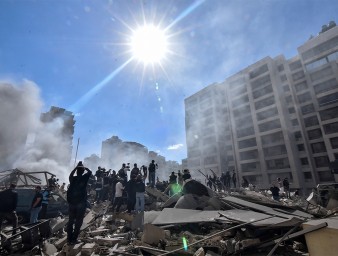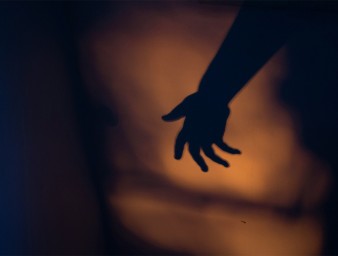Protecting and respecting the dead makes us human
05 July 2024

In April 2021, Morris Tidball-Binz, a forensic doctor and national of Chile and Argentina, was appointed as the UN Special Rapporteur on extrajudicial, summary or arbitrary executions. During the 56th session of the Human Rights Council, he presented a report on the Protection of the dead. Tidball-Binz shares his views on why protecting the dead is a human rights issue and why he recommends the development of a human rights–based guiding principles for the protection of the dead to bridge the gap between different levels of protections for dead persons under international law.
Why do the dead need protection and why is this relevant from a human rights perspective?
The protection of and respect for the dead is something that makes us human. It’s prevalent, since the beginning of humanity, in all cultures and religions and is regulated in religious, cultural and social practices around the world, in national laws and also in International Humanitarian Law that applies in times of war.
I decided to address the issue from the perspective of my mandate by proposing the elaboration of guiding principles based on international human rights law for the protection of the bodies and human remains of deceased persons in all circumstances, but especially in cases of people who have been victims of potentially unlawful deaths.
Why should all unlawful deaths be investigated through a human rights lens?
The investigation of all potentially unlawful deaths by States and authorities is not an option, it’s an obligation under International Human Rights Law. And it’s obvious and logical that, in order to properly investigate a potentially unlawful death, the body of the victim is essential to be able to investigate in a manner that corresponds to international standards, including the Minnesota Protocol.
On the other hand, there is the family's right to mourn and to recover the remains of their deceased loved ones.
Why should the needs of families and communities be at the centre of any measures taken to protect the dead?
This is a fundamental right of families: a right to know what happened to their loved one, disappeared or deceased. And related to this is the right to the truth, to know specifically what happened and linked to this, the right to justice, to life and to reparation. Reparation measures have to do with the non-repetition of the facts, and combating impunity is the first step to avoid the repetition of these events.
All of this requires an investigation that must be carried out in accordance with international standards and in an expeditious way but also in a thorough, complete, transparent and credible manner. Two fundamental concepts are the independence and impartiality of investigations to ensure that the results of the investigation, whatever it may be, are reliable and credible.

Morris Tidball-Binz, United Nations Special Rapporteur on extrajudicial, summary or arbitrary executions presents his latest thematic report to the Human Rights Council during its 56th session. © HRC/Renatha Amaral
“
I learned much, if not all I know about protecting the dead, from the families of the disappeared and those killed by dictatorships in South America. It was their vision to use forensic science to search for, identify and determine the cause and manner of death of their loved ones, disappeared and killed by dictatorships.
“
Morris Tidball-Binz, United Nations Special Rapporteur on extrajudicial, summary or arbitrary executions
How does the protection of the dead connect to the protection of other human rights?
The protection of the bodies and human remains of deceased persons, especially in cases of persons who have died as a result of human rights violations, specifically the violation of the right to life, in many cases affects other rights of the victim and his or her family members. The direct suffering that this situation causes for families can be equated, especially in the case of disappeared persons, to torture. There are a range of rights that are affected when there is no access to the body, when the victim's body is mutilated, destroyed, when their dignity is not respected.
My proposal not only aims to ensure that the duty of States to investigate all potentially unlawful deaths is fulfilled by guaranteeing access to and protection and care of the bodies of the victims, but also extends to a series of other rights and emphasis is made on the protection of the dignity of the deceased.
What are the main challenges?
That there is no clear set of rules, no set of guiding principles reminding States of their obligation to protect and respect the bodies of deceased persons in all circumstances. Another challenge is the lack of resources and expertise in the field. In other cases, there is a situation in which perpetrators of unlawful deaths deliberately destroy or try to hide the remains of victims' bodies to avoid an investigation.
The elaboration of guiding principles aims to address these three aspects. Obviously, when there’s a deliberate action to destroy the body, the fact that there are guiding principles will not prevent it, but it will make it clearer to determine responsibilities in the future when the time comes to compare the facts with the international obligations that were violated.
This is a matter in which States can assist each other to ensure that all the dead are treated with dignity, regardless of their origin, social status, etc. We all have the same dignity as human beings, and this extends to the dead.
What are some good practices you have observed?
I think it’s very important to show in a report like the one I presented, that where there’s a will, there’s a way to do things well, even in contexts with very few resources, and the report is full of examples of good practices. There are the best-known good practices such as military cemeteries. But, for example, regarding victims of deaths not directly related to armed conflicts who have been or are duly treated with dignity, the report mentions the management of migrants' corpses in some contexts. There are many areas in southern Italy, in Catania, where the community, the municipality or the actual people have taken it upon themselves to create specific cemeteries to bury the bodies of deceased migrants recovered from the sea, whose identity is unknown, and always ensuring that the body, regardless of condition, is buried in a dignified manner. And they are keeping all the information about the body that may be useful in the future for its eventual identification and restitution to their families. This is a beautiful example, where very local communities, with few resources, but with a human vision, act in an extraordinary way and remind us of the foundations of the Universal Declaration of Human Rights.



